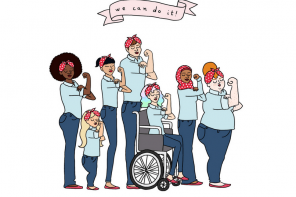Let’s talk about sex. Specifically, let’s talk about Sex Ed.
As someone who’s been researching infertility in the Jewish community, my concern is not the typical public debate over abstinence education. No, it’s that Sex Ed in the United States focuses almost entirely on pregnancy prevention.
While that is an understandable objective when speaking to young people, it’s not the whole story. Nor, in the long run, is it the most critical bit of biological knowledge — whether your big picture focus is Jewish continuity, or the consequences of American women more broadly delaying childbearing.
For those teens who eventually want to become parents, knowing how to support a pregnancy — once they are ready for parenthood — is crucial. It may also be much more complicated than they anticipate.
As Barbara Collura, president and CEO of RESOLVE, a nationwide infertility support and advocacy organization, observed in a phone interview:
We see the downstream results of [Sex Ed], where everybody feels pretty comfortable knowing how to prevent pregnancy, but nobody has any good idea about how your reproductive system works, and when it’s not, how to recognize that and the signs — including some potentially preventable things that people should be aware of.
Infertility affects one-in-eight couples in the United States. However, within the Jewish community, that number jumps closer to one-in-five couples, according to the Puah Institute, which offers fertility support rooted in Jewish law.
Ashkenazi Jews are more likely to be carriers of certain genetic diseases. However, Dr. Jerald Goldstein, the founder and medical director at Fertility Specialists of Texas, emailed, “age is the most important predictor regarding fertility issues.” And Jewish women, like highly educated American women of all backgrounds, are more likely to delay motherhood.
The aforementioned data underscores that there is a sizable group of Jewish adults who would happily parent the next generation but are finding parenthood an uphill battle. The big question then is, how should we help?
There are a number of possible responses for those adults currently on fertility journeys, as explored in my January column. However, for teenagers, the simplest and most effective solution may simply be changing how we talk about sex, whether at home, in schools, or in religious settings.
In addition to teaching pregnancy prevention, we need more education about how the reproductive system works. That includes teaching about the 12-month and 6-month time horizons that are typical conception windows — dependent on maternal age — and after which couples should seek medical guidance. Even if teens don’t focus on this information at the time, it’s better to plant a seed, in case they need it later.
RESOLVE’s Collura noted that Polycystic Ovary Syndrome (PCOS) and Endometriosis are two of the most common conditions among her organization’s constituents. They also happen to be conditions that can be diagnosed during the teen years. Yet, Collura says, “health providers are under- diagnosing or misdiagnosing these problems.”
This is problematic. When you’re living with a health condition that not only causes you regular pain but also has implications for your future fertility, you should know, so you can make more informed decisions about your future, including when and how to start your family.
Collura is a big believer that knowledge is power, observing that women “might choose to freeze their eggs, be proactive in taking medication, or have different types of treatment protocols earlier.” She added, “Most people talk about their infertility diagnosis as devastating, but if you knew all along, how would that affect your mental health? If it’s something you’ve lived with, known about, and been addressing, it’s a very different circumstance.”
Indeed. If starting a family will be harder than what’s presented in a traditional Sex Ed overview, it’s better to know sooner.
For the sake of our children, we should speak to them openly (when they’re ready) about the reality and prevalence of fertility challenges. We should also reach out to our local educational and religious leaders, encouraging them to embrace a more holistic view of Sex Ed, because for most adults, preventing pregnancy is only one piece in a complex puzzle — and not even the most memorable one.
Written by: Melissa Langsam Braunstein





